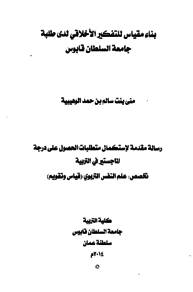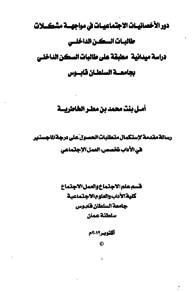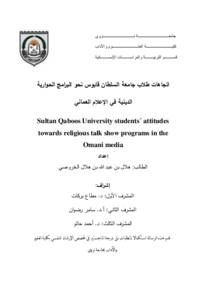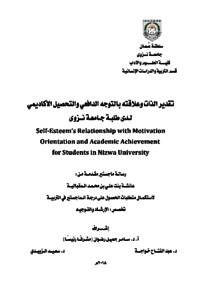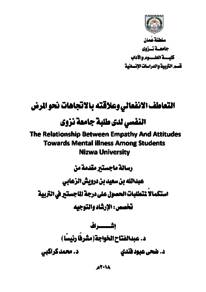Document
بناء مقياس للتفكير الأخلاقي لدى طلبة جامعة السلطان قابوس.
Publisher
جامعة السلطان قابوس
Gregorian
2014
Language
Arabic
Subject
English abstract
The current study aimed to develop a scale of moral reasoning for Sultan Qaboos University students, and investigated its psychometric properties (Validity and reliability). Moreover, the levels of moral reasoning were examined by gender and major (humanities or science colleges). The sample of the study consisted of (446) students. The scale consisted of (5) stories with (16) items. The scale validity was verified by two methods: face validity and concurrent validity. The face validity was examined by a panel of refrees who reviewed the scale and approved its ability to measure the moral reasoning. The concurrent validity was verified by administering the Scale and the Moral Value Scale to a sample of 65 students and the Moral Intelligence Scale to a sample of 45 students. Pearson correlation coefficients were calculated and found to be (0.622) and (0.55) respectively. These results indicated acceptable validity. The reliability of the scale was examined by Cronbach's alpha coefficient which was found to be (a = 0.70), ensuring internal consistency of the scale. Chi-square was used to test the distribution of students across the levels of moral reasoning. The results showed that more than half of the sample (62.2%) was on the second level (Social system and conscience). The results aso showed that there was no statistically significant difference between the distribution of the students across the levels of moral reasoning with respect to gender. On the other hand, there was a statistically significant difference between the distribution of humanities and sciences students across the levels of moral reasoning. The results of this study were discussed in the light of latest published literature followed by recommendations and suggestions for future studies and investigations.
Member of
Resource URL
Arabic abstract
هدفت هذه الدراسة إلى بناء مقياس للتفكير الأخلاقي لدى طلبة جامعة السلطان قابوس. والتحقق من خصائصه السيكومترية (الصدق، الثبات)، والتعرف على مستويات التفكير الأخلاقي لدى طلبة الجامعة باختلاف الجنس والتخصص. وقد تكونت عينة الدراسة من (446) طالبا وطالبة. وتكون المقياس في صيغته النهائية من خمسة مواقف تتضمن (۱۹) سؤالا. تم التحقق من صدق المقياس باستخدام الصدق الظاهري من خلال عرض المقياس على مجموعة من المحكمين، الذين أكدوا قدرة المقياس على قياس ما صمم لقياسة، بينما تم التحقق من الصدق التلازمي من خلال تطبيق المقياس إلى مقياس القيم الأخلاقية على عينة من مجتمع الدراسة حجمها (ن= 65)، ومقياس الذكاء الأخلاقي على عينة أخرى حجمها (ن=45)، وأيجاد معامل ارتباط "بيرسون" الذي بلغ ( ۱ , ۱۲) و (۰٫55) على الترتيب، مما يدل على صدق المقياس. أما بالنسبة لثبات المقياس فقد تم التحقق منه من خلال مؤشر الاتساق الداخلي والذي بلغ لمعامل ألفا لكرونباخ (۰٫۷۰). وفيما يتعلق بتوزيع مستويات التفكير الأخلاقي لدى عينة الدراسة، تم حساب التكرارات والنسب المئوية واستخدام اختبار مربع کاي (x2). وأظهرت النتائج أن أكثر من نصف عينة الدراسة هم في المستوى الثاني (النظام الاجتماعي والقانون) من مستويات التفكير الأخلاقي ويشكلون نسبة (۹۲٫۲%). كما أظهرت النتائج أنه يوجد فرق دال إحصائيا في توزيع الطلبة على مستويات التفكير الأخلاقي يعزی المتغير التخصص (علمي، انساني)، بينما لا يوجد فرق دال إحصائيا في توزيع الطلبة على مستويات التفكير الأخلاقي يعزي لمتغير الجنس. وتمت مناقشة النتائج في ضوء الاطار النظري، كما تم وضع بعض التوصيات والمقترحات المتعلقة بالموضوع.
Category
Theses and Dissertations

